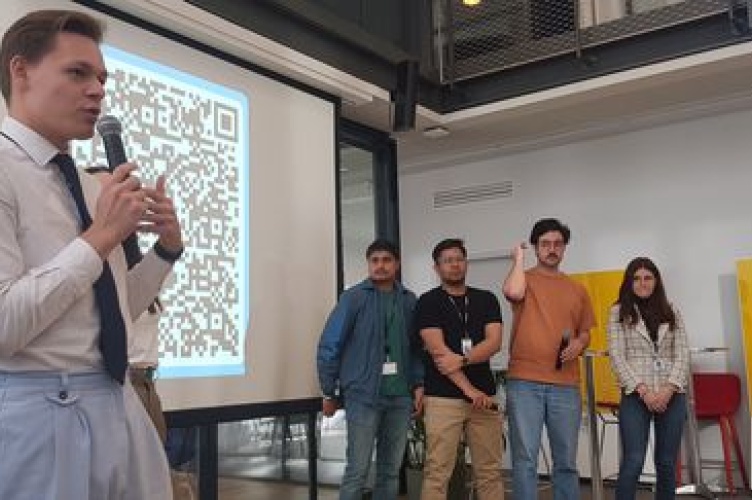Crafting new imaginaries for sustainability in 2030: the role of media in sustainable transition
In January 2021, ESCP and OnePoint launched a new elective course entitled "Design Fiction for Sustainable Futures" as part of the Circular Economy Chair.
This 30-hour elective course allowed MIM students to work with renowned futurists and designers to explore the role of media achieving a sustainable society.
Prof. Aurélien Acquier, Associate Dean for Sustainability explains: “ESCP Business School has adopted an ambitious sustainability strategy, in particular through its educational missions, scaling-up sustainability ambitions within the ESCP curriculum. This course is perfectly aligned, supporting the sustainable transition of the school and building awareness among its students.”
The course was developed by Aurélien Acquier, Valentina Carbone (Professors ESCP Business School), and Martin Lauquin, co-founder of the collective “Making tomorrow” and Creative Strategist at Onepoint. They also wrote an Impact Paper “Crafting new imaginaries for sustainability? What design fiction can bring to sustainability education”, one of the 54 contributions to the “Better Business: Creating Sustainable Value” e-book.
To address sustainability challenges through the Design Fiction perspective, ten lecturers and experts were involved to provide students with an ability to engage with diverse temporalities and perceptions at different scales (individual, organisational and societal); to research, understand and synthesise insights from diverse disciplines; to be critical about unquestioned assumptions; to detect key ethical and cultural dimensions of our era and society; to be constructive by using various media to convey and stimulate longer-term visions of the future, and to be able to raise questions for today models and behaviour.
What is design fiction?
“Design fiction for sustainable futures helps understanding the current and future environmental challenges, the Design Fiction approach helps understanding and shaping multiple possible futures in order to design tomorrow’s products, services and business models in a constantly changing world”, pointed out Martin Lauquin.
Prof. Valentina Carbone is delighted to have this course extending the ESCP portfolio in sustainability: “So far, we were feeding the students' brains, we decided with this course to also feed their hearts so that they can take action, by combining sustainability issues and fiction design. Renewing current approaches to risk management and innovation, developing prospective design capabilities can represent a real strategic asset for companies to shift towards sustainable business models.”
Among different prospective oriented approaches, Design fiction is increasingly used by organizations to apprehend, model and test their possible futures. By imagining the world's evolutions in 15 or 20 years and materializing them into fiction related artefacts (videos, newspapers, short novels…).
A course on the role of media in achieving a sustainable society
On April 11, during the 9th and final module, students presented their work to a Jury gathering Onepoint and Groupe Les Echos Le Parisien.
A lot of themes emerged from this 2022 edition such as:
- the impact of (social) Media content on climate change upon individual emotions and anxiety
- governance model of traditional media and possible controversies in terms of political and economic power
- who will win the battle for engaged journalism: traditional vs new media?
- what does it mean being a journalist in a dystopic future?
- new technologies trends, such as Metaverse, filter bubbles..., and their influence upon media content related to the ecological transition
The movie Don’t Look Up used the metaphor of an impending, Earth-obliterating comet to satirize the ideological denial of climate change that pervades much of public discourses and medias. For this second edition, students explored the role that the media can play in contributing to a sustainable society and confronted themselves with high-level international experts who shed light on this issue with complementary angles: IPCC Experts, journalists, from traditional and social media, futurists, anthropologists, designers, etc.
"We have a key role to play in this ecological transformation" says Capucine Pêtre, Innovation Director at Groupe Les Echos Le Parisien. "Provinding readers with information to enhance their skills on this topic and making people willing to act." And Claire Ferrero, Strategic planner at Groupe Les Echos Le Parisien adds: "students pointed out challenges we are also working on. Getting their perspectives is a real opportunity for us."
As an example, the Design Fiction “Social Zen”, one of the fictions produced by the five group of students involved in the course, questions the rise of exo-anxiety that comes from observing the seemingly irrevocable impact of climate change through the lens of social medias and the associated concern for one’s future and that of next generations. Congratulations to Greta Cappello, Kuzma Glazovskii, Alexandra Podvarkova, Aditya Shrikrishna Pand, Bitthal Sing Yadav and Arthur Sahaghian.
Campus

![© Adobe Stock - ViennaFrame [copyright] © Adobe Stock - ViennaFrame [copyright]](/sites/default/files/styles/home_listing/public/2021-03/Sustainability-thesis-award.jpg)
![© Adobe Stock [copyright] © Adobe Stock [copyright]](/sites/default/files/styles/home_listing/public/2020-12/Sustainability_research.jpg)